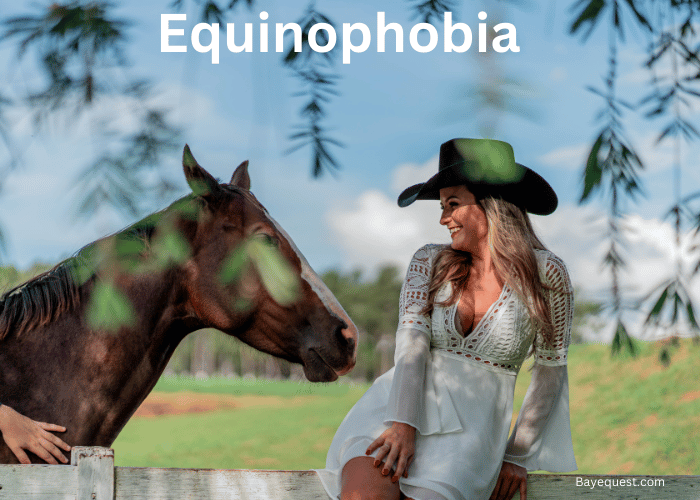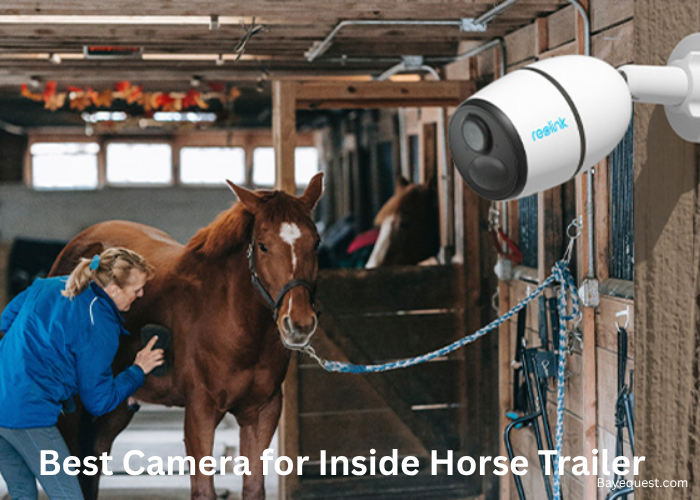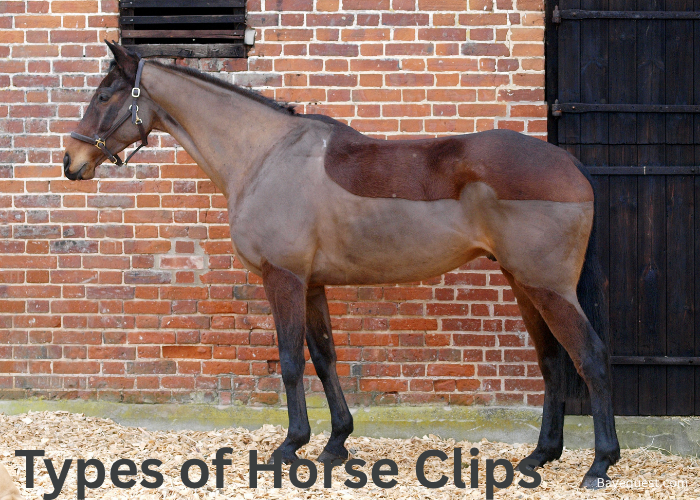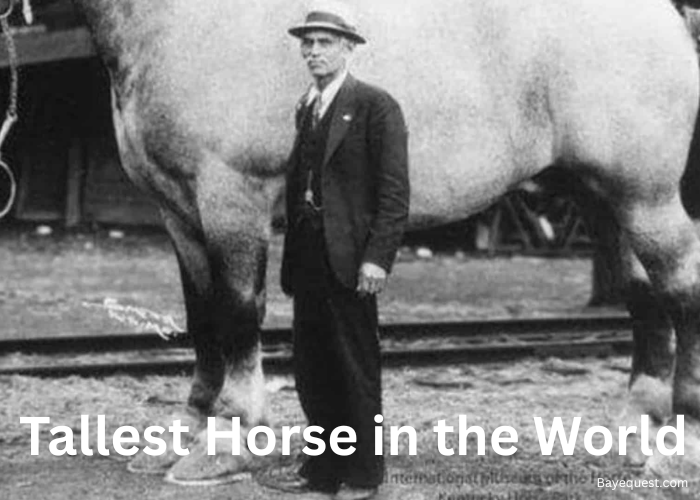Did you know that nearly 5% of adults experience equinophobia, a debilitating fear of horses? Despite these majestic animals being symbols of freedom, they can incite panic in many.
As a lifelong equestrian, I’ve helped numerous individuals conquer this fear. In this article, I’ll delve into the roots of equinophobia and share practical strategies to overcome it.
Whether you avoid horses or simply want to understand this fear, you’ll find valuable insights ahead.
Fear of Horses: Key Takeaway
Equinophobia is the intense fear of horses. It often stems from traumatic incidents, like falling off a horse or being bitten. This phobia can extend to donkeys, mules, and ponies. Effective treatments include exposure therapy and cognitive-behavioral therapy (CBT), which reduce anxiety by changing thought patterns and increasing controlled exposure to horses.
What is Equinophobia?
Equinophobia means being scared of horses. It’s not just feeling a bit uneasy around them.
It’s a deep fear that can make you feel shaky, sweaty, or have a fast-beating heart. Just thinking about horses can even make you panic or feel anxious.
This fear is so strong that it can stop you from doing everyday things. For example, you might avoid places like farms or events where horses will be, just to stay away from them.
Sometimes, this fear comes from a bad experience with a horse, scary stories, or seeing someone else who’s afraid.
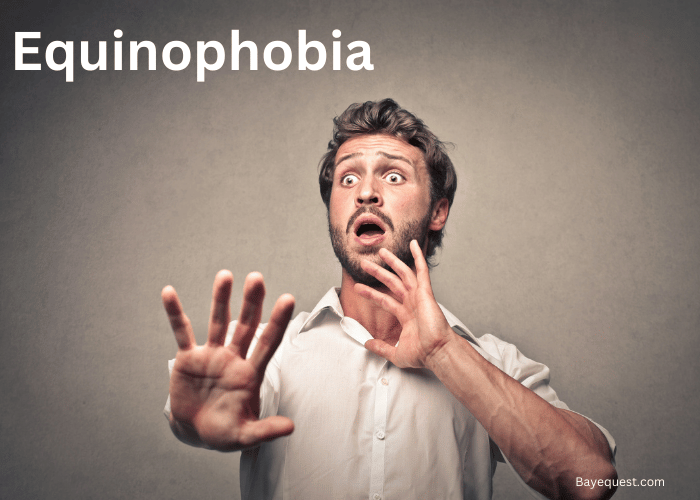
Causes of Equinophobia
This phobia can be rooted in various factors. These include:
Traumatic experiences
One big reason people might be scared of horses is if they’ve had a bad experience with one. This could be anything from getting bitten or kicked to being thrown off while riding.
Sometimes, seeing someone else have a scare with a horse or just having a close call can shake you up. Horses are big and strong, so it’s understandable why a scary moment with one could stick with you.
This kind of scary moment can make the brain see horses as dangerous. It’s like your brain is trying to keep you safe by making you want to stay away from horses.
But if this fear starts to take over and makes it hard to go about your day, it might be equinophobia. Therapy, especially the kind where you slowly and safely get to be around horses again, can help.
It teaches you that being around horses doesn’t have to be scary and that you can handle your fear.
Interesting read: Why Do Horses Bite?
Negative encounters or accidents
Beyond traumatic experiences, even minor negative encounters or accidents involving horses can contribute to equinophobia.
You don’t need to experience a severe injury. Something as simple as being nipped by a horse or a fall that wasn’t traumatic can still instil a lasting fear. Such incidents might make you view horses as unpredictable or dangerous.
Psychological factors
Your psychological makeup, anxiety levels, susceptibility to stress, and personal coping mechanisms can influence equinophobia. If you are more prone to anxiety or have a tendency to react more to fear, you might be more likely to develop phobias.
Psychological factors also affect how you process and remember experiences with animals.
Genetic predisposition
There’s evidence suggesting that phobias can have a genetic component. If a close family member has a phobia, one might be more predisposed to developing similar fears.
This genetic link suggests that the propensity for phobias can be inherited.
Influence of media and stories
Stories, movies, or media reports about horse accidents can fuel equinophobia. Graphic images of horse injuries or tales of wild horses can scare people.
This happens even if they’ve never had a bad horse experience. Such portrayals can make them see horses as dangerous. This shapes their fear, making horses seem scary.
Learned behavior
Observing others’ fear of horses can lead to the development of equinophobia. This is particularly true for children who look to adults for cues to react to the world around them.
If a significant adult in a child’s life exhibits fear or avoidance of horses, the child may learn to respond similarly. They may adopt this fear even without any direct negative experiences.
This learned behavior highlights the impact of social learning on the development of specific phobias.
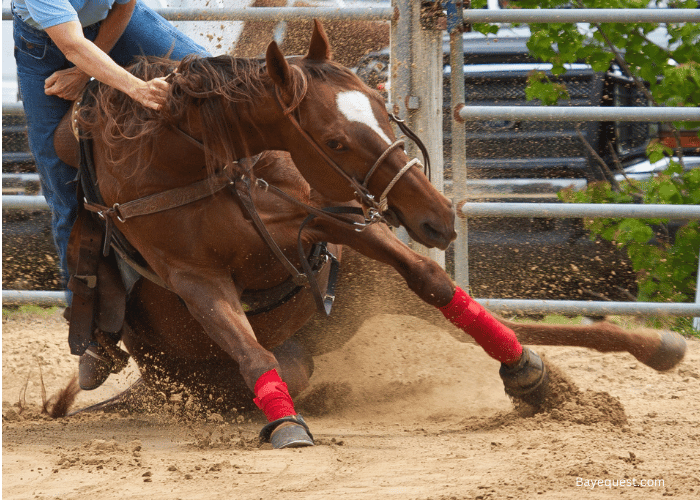
Signs and Symptoms of Equinophobia
Let’s discuss what it looks and feels like, breaking it down into emotional, physical, and behavioral symptoms.
Emotional responses
When someone with equinophobia thinks about horses, sees one, or even talks about them, they might feel intense fear or panic. It’s not just a little worry; it’s a deep, overwhelming dread that feels out of control.
They might also feel anxious, nervous, or even helpless when thinking about being near a horse.
Physical symptoms
This fear isn’t just in the mind; the body reacts too. Someone afraid of horses might start to sweat, shake, or feel their heart beating faster than normal.
They might also feel dizzy or have trouble breathing. It’s like their body is saying, “Danger!” even when they know, deep down, they’re safe.
Behavioral symptoms
Fear of horses can make people do things differently. They might avoid places they know horses will be, like farms, parades, or even certain movies or shows.
If they can’t avoid being near a horse, they might freeze up or look for the quickest way out. It’s all about staying as far away from the source of their fear as possible.
Who is at Risk of Equinophobia?
Individuals at risk of developing equinophobia can come from various backgrounds and experiences. The following people are at risk of equinophobia:
People with previous traumatic experiences involving horses. People who have had negative encounters with horses are at a higher risk. These traumatic events can leave a lasting impression, leading to a persistent fear of horses.
Individuals with general anxiety disorders. Those who suffer from anxiety disorders or have a predisposition to anxiety are more susceptible to developing phobias. Their heightened sensitivity to fear and stress can make them more likely to develop irrational fears.
Children. Children are at risk due to their developmental stage and how they process experiences. A frightening encounter with a large animal like a horse can significantly impact. Additionally, children are more likely to mimic the fears of adults around them.
Those with a family history of phobias. Genetics plays a role in the development of phobias. If there’s a family history of specific phobias, an individual may be more genetically predisposed to develop equinophobia.
Those exposed to negative depictions of horses. Individuals exposed to media, stories, or reports highlighting the dangers associated with horses might develop a fear. Constant negative portrayal can influence one’s perception, making the idea of interacting with horses anxiety-provoking.
How to Overcome the Fear of Horses
Beating a fear of horses, or equinophobia, is all about taking small, smart steps. Here’s how you can work on overcoming this fear:
Understand the fear and its cause. Start by getting to the bottom of your fear. Ask yourself what exactly about horses scares you. Was there a bad experience in the past? Understanding this can help you face the fear head-on.
Learn about horses. Knowledge is power. The more you know about horses, their behavior, and how they communicate, the less mysterious and scary they’ll seem. Read up on them, watch videos, or even take a class about horse care and behavior.
Interact and spend time with horses. When you’re ready, try to spend time around horses slowly. This could be as simple as watching them from a distance first, then moving on to standing close to them, and eventually touching or feeding them. Each small step is progress.
Don’t force progress. It’s okay to take your time. Don’t rush yourself into situations you’re not ready for. If you’re feeling overwhelmed, it’s perfectly fine to step back and go at your own pace.
Improve physical fitness. Being physically fit can boost your confidence around horses. Basic fitness can help you feel more in control of your body and less vulnerable when near these large animals.
Find the right horse. Not all horses are the same. Some are more gentle and patient, especially with beginners or people who are afraid. Working with a calm, experienced horse can make a big difference in how comfortable you feel.
Remember, overcoming a fear of horses doesn’t happen overnight. It’s about building trust: trust in yourself, trust in the process, and trust in the horses you’re learning to be comfortable around. Take it one step at a time, and celebrate the small victories.
Read also: Horse bonding dos and don’ts.
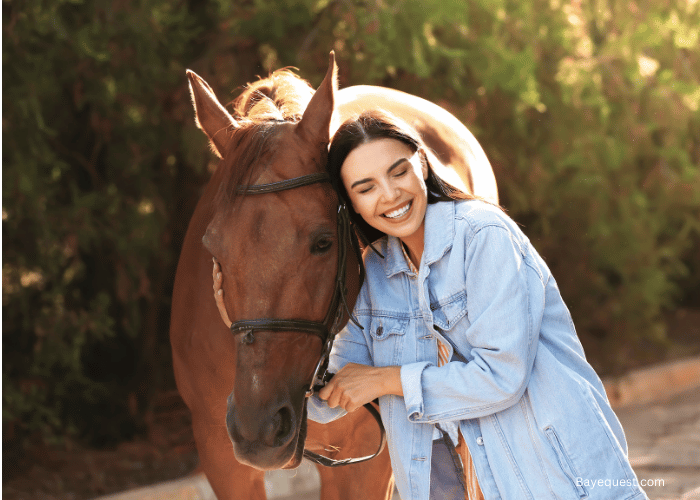
How is Equinophobia Diagnosed?
Diagnosing equinophobia involves a few steps and relies on a professional evaluation. Here’s how it typically goes, in simple terms:
Talk about your feelings and experiences. The process starts with a detailed discussion. You’ll talk about your feelings when you’re near horses or even think about them. This conversation helps the professional understand the depth of your fear and how it affects your life.
Compare your fear to diagnostic criteria. Mental health professionals use guidelines like those in the DSM-5, to figure out if your fear matches the pattern of the phobia. For equinophobia, they’ll look to see if your fear of horses is intense, persistent (lasting for six months or more) and if it disrupts your daily life.
Rule out other conditions. The professional will also check if your fear is part of another disorder. They have to ensure the fear of horses isn’t a symptom of something else.
Assess the impact on your life. Part of diagnosing equinophobia involves understanding how the fear limits your activities.
NOTE: There is no single test, like a blood test or an X-ray, for diagnosing phobias. It’s more about talking, understanding your feelings and behaviors, and comparing them to established criteria.
How is Equinophobia Treated?
If you’re diagnosed with equinophobia, the good news is there are effective treatments that can help you manage and even overcome this fear. Let’s walk through some of the main ways people work through this fear:
Exposure therapy
This is like learning to swim by slowly getting into the water. With the help of a therapist, you gradually face what scares you—in this case, horses.
You start small, maybe just looking at pictures of horses, and step by step, you work up to being closer to them until you feel okay about it. It’s all about taking it slow and steady.
Cognitive Behavioural Therapy (CBT)
CBT is like detective work for your thoughts. It helps you find and change the scary thoughts you have about horses.
With a therapist, you’ll learn to challenge and replace these fears with more positive, realistic thoughts. It’s about understanding that your fear of horses can be managed by changing how you think and react to them.
Clinical hypnotherapy
This might sound out there, but it’s another way to tackle the fear. In a relaxed state, a hypnotherapist helps you reach your subconscious mind to suggest new, calmer thoughts about horses.
It’s like planting seeds for bravery in your mind, helping you feel less afraid when awake.
Medication
Sometimes, doctors might suggest medicine, especially if the fear is intense and interferes with everyday life.
Medication isn’t a cure, but it can help manage symptoms like panic attacks or extreme anxiety, making it easier to work on your fear with therapy.
FAQs
What is hippophobia?
Hippophobia is another term used to describe the fear of horses, similar to equinophobia. It comes from the Greek words “hippos,” meaning horse, and “phobia,” meaning fear. Like equinophobia, hippophobia is a specific phobia characterized by an intense and irrational fear of horses.
How long does it take to overcome equinophobia?
The time it takes to overcome equinophobia varies from person to person. It depends on the severity of the phobia, the treatment method, and how you follow through with treatment. Some might see improvements in a few months, while others might take longer. It’s a personal journey, and patience and commitment to the treatment plan are key to success.
Equinophobia: Conclusion
It’s clear that while the fear might loom large, casting a long shadow over life’s pleasures, there’s a beacon of hope. You can beat equinophobia with the right mix of understanding, patience, and professional guidance.
Remember, the goal isn’t to transform into a horse whisperer overnight. It’s to reach a place where the thought of horses brings curiosity, not panic.
So, to those feeling trapped by their fear, know this: your feelings are valid, but they don’t define you. You can reclaim your freedom one gentle trot at a time with each small step.
Here’s to facing our fears, embracing the journey of healing, and maybe, just maybe, finding a new friend in these noble creatures along the way.




